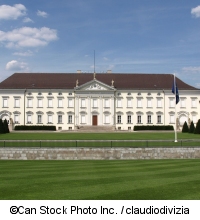The role of the President in Germany is largely ceremonial.
He or she is elected not by the people, but by the Bundesversammlung – a rather strange arrangement consisting of the members of the Bundestag (lower house), Bundesrat (upper house), as well as representatives from each state’s parliament. It is the largest political entity in Germany, currently with 1244 members. The Bundestag members make up 50% of the votes.
And since the amount of votes each party holds depends on their share of power in each of the states, the Bundesversammlung does not necessarily reflect the normal political state of the country as a whole.
When President Horst Köhler resigned on Monday, the wheels were set in motion to calculate the membership for the election of a new president by the end of June. The German constitution allows only 30 days for this to happen. Three days later, and despite modern technology those calculations continue.

Schloss Bellevue in Berlin - official residence of the German President
But why does Germany need a new president in the first place? Apparently President Köhler gave an interview last week which was – as far as I understand – reported out of context. He was asked for clarification by some of the major political parties. And then he resigned. It all happened very quickly.
In fact, the media has been more interested in the sudden resignation and whether it was necessary, than what he actually said in that interview. [Read more…]
